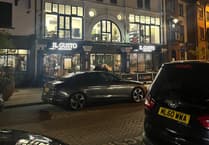Gwent Police do not routinely monitor social media for potential hate crimes, a senior police officer has said.
Inspector Ioan Williams was responding to a question from a councillor who had raised concerns about “low-grade hate crimes” related to comments, which she claimed to have seen in a local Facebook group.
Cllr Jan Butler, who represents Goetre Fawr, south of Abergavenny, said she had been concerned by comments made in a local Facebook group and asked if police look out for comments on “village Facebook groups”.
However the inspector, who has responsibility for Monmouthshire, told the Conservative councillor that officers do not proactively look on social media for comments of the type she described.
He said: “We don’t actively monitor people’s Facebook groups etc unless we were invited in for a specific purpose or whatnot.
“We wouldn’t do that unless we were gathering specific intelligence around an issue, obviously we do have capabilities from a cyber crime perspective, but no we certainly wouldn’t monitor groups in that manner – and I wouldn’t like to suggest that we would either, just from a human rights perspective and things like that.”
But he said if councillors do see things that concern them they can contact the police and they may be able to offer advice and “maybe just help with people’s understanding in differences in culture”.
He said: “If you have an issue like that you’d want to raise with us as there will be help somewhere, there’s many resources we can tap into.”
Insp Williams was attending Monmouthshire County Counci’s public services scrutiny committee, via video call, but said as he was doing so, at short notice in place of chief inspector John Davies, he was unable to provide further information on hate crime figures the committee had requested.
Caldicot West End councillor Jill Bond said she felt “quite uncomfortable on behalf of the inspector” who she said had been “dropped in it” but the Labour members said the committee had wanted to know how the figures related to the demographics of the area.
Inspector Williams said without further details on hate crime figures he could only say: “Looking across the Gwent force area they are lower than in other areas in the eastern local policing area which is Monmouthshire and Newport.”
He also stated that the majority of hate crime incidents in Monmouthshire were either related to sexual orientation or disability.
The inspector explained any reported incidents, “which do not have to be crimes”, are included in a detailed briefing produced every 24 hours.
He further added that there are specific officers who manage hate incidents and if they are criminal offences they are allocated to officers who are supported by the specialists and an incident is logged as related to prejudice if that is how it is perceived and reported by the victim.
In response to a question of whether there is “significant under reporting” of hate crime the inspector replied: “I think all crime is under reported and we are doing as much as we can to encourage more reporting through various mechanisms such as social media.”
Committee chair Cllr Armand Watts asked if the inspector felt austerity was impacting the police service but the inspector said “wider issues” were above his “level” and said: “That’s not something I’m willing to hang my hat on or have a wider discussion on in an open forum.”
But he said there are “good officers” working in Monmouthshire and “enough resources to deal with the issues we have” and there is ongoing recruitment which will see a percentage increase in the county.
Independent councillor for Magor Francis Taylor said she had previously been a member of the now disbanded Gwent Police Authority and the force had introduced a ‘Step Ahead’ programme in 2007 which managed a “significant” reduction in the number of officers.
Cllr Taylor said at the time Gwent had around 1,500 officers and she understood numbers are now “back up” to around 1,350.





Comments
This article has no comments yet. Be the first to leave a comment.